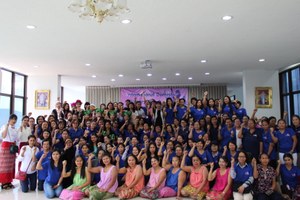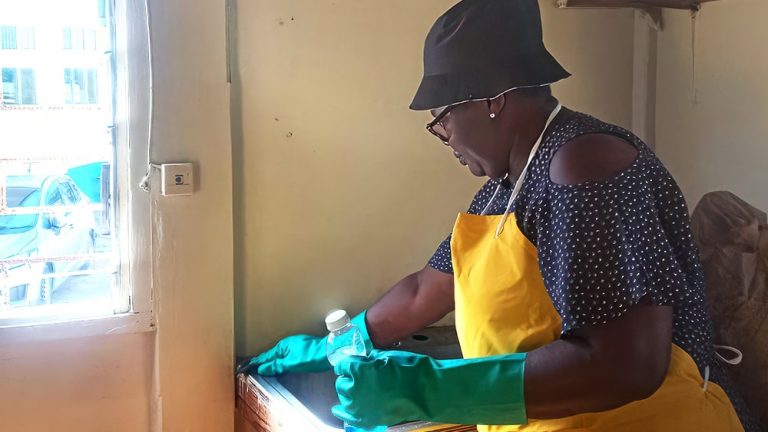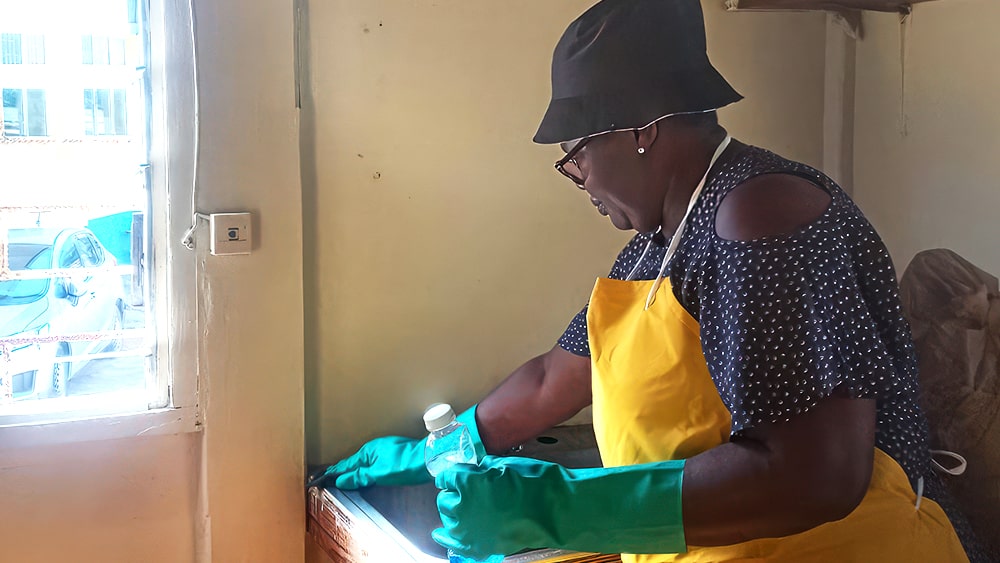IDWF Calendar 2022

Details
Kanyarat Journey from Fragile Childhood to Leadership and Unionism
The photo featured for the month of April was taken in 2018 in Thailand. It was the celebration of International Women’s Day, on May 8, when Kanyarat Panya, executive committee member from the Network of Domestic Workers in Thailand (NDWT) made the banner. She wanted to encourage people to stop violence in the workplace and remind them that domestic work is work, and that the household is a workplace too. We met with Kanyarat to learn more about her journey.

Kanyarat Panya joined the Network of Domestic Workers in Thailand (NDWT) in 2010. But before that, she was not familiar with unionizing. She remembers fondly with a giggle in her voice: “I thought to myself, do members need to sell a product in order to belong to the organization?” It was another domestic worker, Kanyarat’s neighbor in the building where she worked, that introduced her to NDWT. After hesitating a little bit, Kanyarat went to a meeting and found it very useful. She then realized that such a space is very important for her to share issues and doubts she has about her employment situation. Whom else would she be able to think with about the struggles she faces, if an employer does not pay a bonus, or if she does not know how to approach an employer about a difficulty she is having: “I feared that if I do not present something in a correct manner to my employer, it would reflect negatively on me,” Kanyarat says. “But after joining NDWT, I had more confidence not only to discuss issue at my workplace, but also to share my story with other workers.” Kanyarat also appreciated the overwhelming feeling that she is not alone, that there are many domestic workers in her situation, and in worse situations. She is now able to help them.
Before becoming a domestic worker, Kanyarat was first a construction worker at the tender age of 18. She left the industry when she met her husband. She then started performing various services at an office: she cleaned washrooms, prepared coffee, and tea, welcomed clients. There, she started to learn English by practice: already having a base of knowledge from the time she was a schoolgirl, Kanyarat was picking up English skills and her workplace, and putting in a lot of effort to improve it at home. She would study from the dictionary, looking up words like water, rice, milk. She was able to greet customers and have basic conversations with them. When Kanyarat lost the office job, her sister came to her help and introduced her to one of her first individual employers. The job was to do domestic work on a part time basis. Kanyarat found the flexibility of the hours more appealing than a 9 to 5 job.
Kanyarat completed grade 9 at school, but it was a difficult ride. Her father had passed away when she was 8 years old, leaving 7 children. To help her mother, at that fragile age, Kanyarat started working in a Chinese convenience store where she would set up shelves. She would then go back home and help her mother prepare food for her siblings and get them ready for school. This has made her always late: “When I’d arrive late to school, my punishment was to sing the national anthem,” she laughs. As many other young girls, she wanted to be a teacher or a doctor and had dreamed of world that were bigger, fuller, lighter on the heart than the life she led. However, life had more hardships in store for Kanyarat.
Choking on a bitter memory, very vivid in her mind, Kanyarat discloses the event that changed her life forever: “When she reached grade 9, my mother was shot and killed.” They lived far from the city and had many safety concerns. After the tragic death of the mother, Kanyarat’s brother moved the family away from home, hoping to find a safer refuge. This is how she dropped out of school: “I feel very unfortunate every time when I think of my mother’s passing.” Kanyarat says. “If she was not shot and killed, my future would have been better than now. Maybe I could have been a teacher or a doctor.”
Kanyarat wants her family to have a life better than hers. For the longest time, it has just been her and her husband at home, until they had their first child when Kanyarat was 37 years old. They also had a nephew living with them. “We tried to educate them as much as we can both at home and outside of it,” she explained. The children in Kanyarat’s household help with the chores. When her son breaks a dish accidentally while washing it, she tells him it is not a big deal, and he should not feel guilty or worried. She teaches him that doing domestic work is a family activity, it is meant to help and share the load of work. Kanyarat is a domestic worker, but at home, she has some help with the chores: her husband cooks, and he also helps with sweeping floors. “Cleaning is not a woman’s job,” Kanyarat explains. “Because of our culture, it is frowned upon when men do the housework, but there is nothing wrong with that. We are a family, we help each other.” She explains.
In her family, Kanyarat is the only one who studied till year 9, which put a lot of expectations on her, both serving as pressure and encouragement to improve in her profession and increase her household income. She thinks she could not have done it without learning English. “I always tell my family and my fellow workers that to learn another language,” Kanyarat explains. “It does not matter if your grammar is wrong or if you have an accent as long as you can communicate.” Spoken like a true language activist, for having an accent only means that one has done the work to speak in a language that is foreign to them, and that is admirable.
In her family, Kanyarat is the only one who studied till year 9, which put a lot of expectations on her, both serving as pressure and encouragement to improve in her profession and increase her household income. She thinks she could not have done it without learning English. “I always tell my family and my fellow workers that to learn another language,” Kanyarat explains. “It does not matter if your grammar is wrong or if you have an accent as long as you can communicate.” Spoken like a true language activist, for having an accent only means that one has done the work to speak in a language that is foreign to them, and that is admirable.
Kanyarat says that an additional language is a competitive advantage in the labor market. One can get promoted or a raise if they speak English and not only Thai, and it also opens more employment opportunities. This inspired Kanyarat and she in turn inspires those around her. For example, she reads the storybook in English for her son, and her son now can respond to her employers if they speak to him in English. Also, her nephew and niece are willing to learn and are not shy anymore about trying to speak a foreign tongue.
To her fellow workers, Kanyarat also has invaluable advice, especially for women over 50 for whom it is more difficult to get a better job:
While most people work for money, Kanyarat says she works from the heart: “My intention is to take care of my employer’s family. It makes me happy when I do that and reflects in my positive attitude.” Kanyarat advises fellow workers to foster a human connection with the employers and have some conversations with them, not just to go get the job done. She says it breaks the ice when small conversations can be had about how their day was, what they would like to eat, etc. It makes the relationship better and enables the worker to open up more about the working conditions and makes the employer as well more receptive of feedback. Kanyarat also encourages fellow workers to take initiative: “For example, one day, I can ask my employer if I should wash the bedsheets or do some gardening. Instead of the employer telling me what to do, I beat them to it. Then, the feeling is totally different. The employer is not ordering me to do things, but I am offering a choice of services. The working environment would be better and happier.” Kanyarat continues to say that normally, domestic workers hesitate to express their feelings because they worry that they’d lose the job. However, it is necessary to negotiate or reject a job one cannot do. For example, one should refuse washing a window from outside because there is a risk of falling.

A final very important word of wisdom that Kanyarat shares with her fellow younger workers that are new to the sector: “Do not shy out from saying you are a domestic worker. Some people in our society look down upon our sector and think we are not educated, but this is no reason to hide our profession,” she explains. There is a power in numbers, and Kanyarat believes that the most important way to empower the worker and give them the comfort and confidence to speak up about their profession and its conditions is to find friends in the same sector. “Join unions and organizations to share your issues and get advice. A friend can always help you out and hear you out.” If one friend can do that, imagine what hundreds will do!
The NDWT organizes domestic workers in Thailand and advocates for increased legal and social protection of the sector.
You can get involved and support the sustainability of our 590,000 strong movement.
We hope you see yourself reflected in these pages so we can envision a world where we are cared for.







